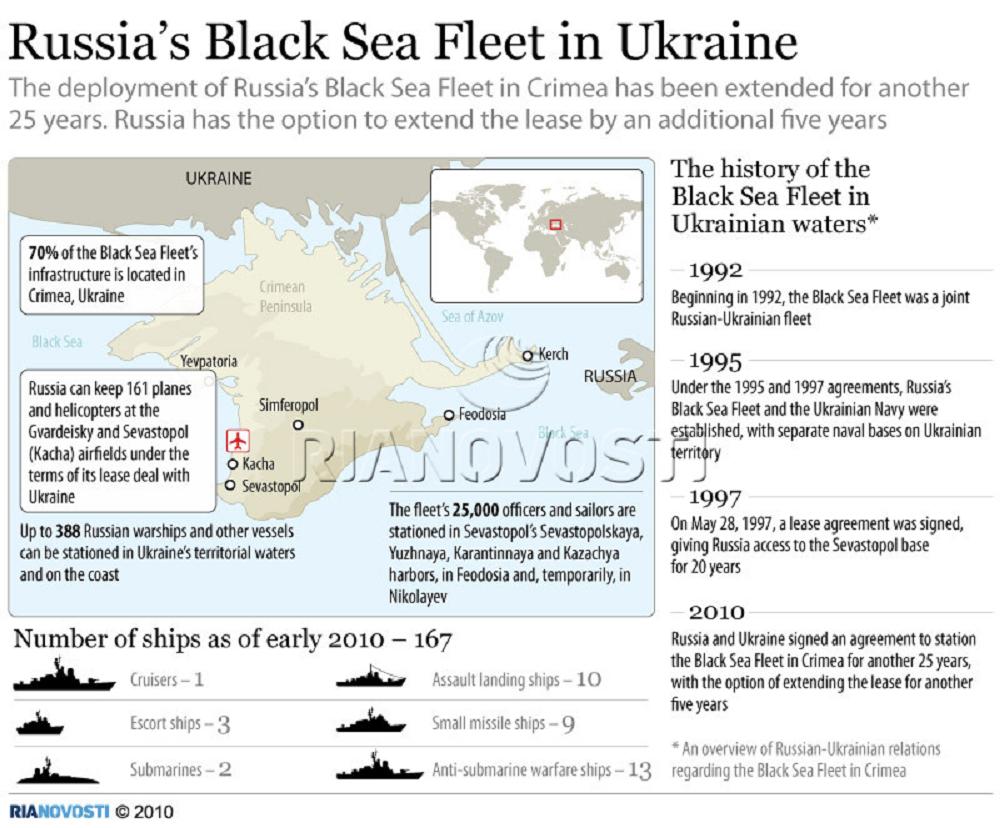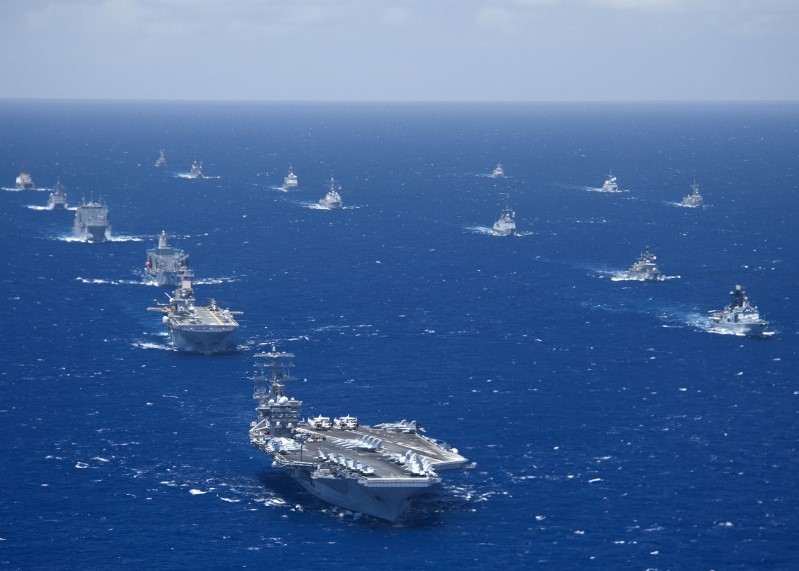Russia's Crimea takeover seen as potential game changer in Mediterranean
 Russia's President Vladimir Putin (C) and Defence Minister Sergei Shoigu (L) watch Russian Air Force parade during their visit s the Crimean port of Sevastopol on May 9, 2014. Putin's visit to Crimea, which was annexed by Moscow in March, is a "flagrant violation" of Ukraine's sovereignty.
Russia's President Vladimir Putin (C) and Defence Minister Sergei Shoigu (L) watch Russian Air Force parade during their visit s the Crimean port of Sevastopol on May 9, 2014. Putin's visit to Crimea, which was annexed by Moscow in March, is a "flagrant violation" of Ukraine's sovereignty.
When President Vladimir Putin paid a visit to Crimea during last week's Victory Day celebrations, he described March's annexation of the peninsula as an act of restoring "historical justness," and military analysts say Russia's famed Black Sea Fleet may play a crucial role in doing just that.
Apart from symbolic and historical significance, Russian sovereignty over Crimea may offer it new strategic opportunities and allow it to project its influence to the Mediterranean and further to the Middle East, as well as to the Indian Ocean via the Suez Canal, analysts said Tuesday.
To mark the 231st anniversary of the Black Sea Fleet on Tuesday, sailors, admirals and residents of Sevastopol laid flowers at the monument to Empress Catherine, during whose reign Crimea was absorbed by Russia before the fleet's founding in 1783. Sevastopol is usually portrayed as a prime example of Russia's military glory — a fact which Putin has made clear he hopes to reinvigorate going forward.

"In the near future, we are waiting in Sevastopol for six new Admiral Grigorovich-class frigates that are currently being built for us in Kaliningrad, six new submarines and also a Mistral assault ship from France," Alexander Vitko, commander of the Black Sea Fleet, said during the celebration.

The Black Sea Fleet (Russian: Черноморский Флот, Chernomorsky Flot) is a large operational-strategic sub-unit of the Russian (and formerly Soviet) Navy
Headquartered in Russia's famous naval base, Sevastopol, the Black Sea Fleet can get to the Mediterranean within one day of sailing, as opposed to the weeks it would take from the Northern Fleet's bases on the Kola. This ease of access allows Russia to exert influence over the Balkans, the eastern Mediterranean and the Middle East.
"The ships can get to the Bosporus overnight, then in a day they can pass the Turkish straits and appear in the eastern Mediterranean; two more days and the ships are near Cyprus, and in twelve more hours they are already approaching the Suez channel," Sergei Gorbachev, a long-time naval historian, said with clear admiration.
"If we had a modern fleet in place, there would have been no bombing of Yugoslavia in 1999 and Libya in 2011. The U.S. would have been more wary about going to Iraq," Gorbachev said by phone from Sevastopol.
Many members of the Russian government and pundits with ties to the Kremlin have expressed hopes that the annexation of Crimea — which is often dubbed an "unsinkable aircraft carrier" — will launch a new chapter in the Black Sea Fleet's illustrious history, but other analysts have warned that this may be wishful thinking.
"We have seen historically that if the U.S. is committed to an operation in the Mediterranean, it will do it and Russia will not have the resources to stop it. We have seen this even during the Cold War, when the best Russia could do was establish its influence in the eastern Mediterranean," said Dmitry Gorenburg, an associate at Harvard University's Center for Russian and Eurasian Studies.
"If Russia was a smaller country with the same economy, it would be easier, but it has to think about China in the Pacific and also the Arctic, so it cannot commit as much resources as it might want to," he said by phone from the U.S.
In January, Russia and China conducted joint naval training exercises in the Mediterranean, with ships from the Baltic, Northern and Black Sea fleets participating. In March 2013, Defense Minister Sergei Shoigu said Russia would create a permanent Mediterranean task force, a move which many experts at the time attributed to Russia's desire to protect war-torn Syria.
"Sevastopol bay has a much better climate, which would make it easier to attract contractors to the Navy," said Prokhor Tebin, an independent Navy analyst in Moscow.

US 6 Fleet stationed in Mediterranean sea
"But we cannot say that military-strategic reasons were the main factor in Russia's decision to annex Crimea. On the contrary, the presence of the Black Sea Fleet made the peninsula avoid the scenario that is currently unfolding in southeast Ukraine," he said.
Bussines Insider: 14. May 2014
This leaked diplomatic cable from 2008 foreshadowed Russia's invasion of Ukraine

Pro-Russian gunmen in Donetsk, east of Ukraine.
Detailing the possibility of admitting Ukraine into NATO on Feb. 1, 2008, then-U.S. Ambassador William Burns wrote that such a move would touch "a raw nerve" with Russia that would engender "serious concerns about the consequences of stability in the region."
"NATO enlargement, particularly to Ukraine, remains ‘an emotional and neuralgic’ issue for Russia, but strategic policy considerations also underlie strong opposition to NATO membership for Ukraine and Georgia. In Ukraine, these include fears that the issue could potentially split the country in two, leading to violence or even, some claim, civil war, which would force Russia to decide whether to intervene," the cable read.
Massive protests swept Ukraine in early February, resulting in the replacement of pro-Russian President Viktor Yanukovych with a government more closely-aligned with western interests. Not long after, Russian troops intervened, seizing key government buildings in Ukraine's Crimea, which Russia later annexed.
On Sunday, the eastern Ukraine cities of Donetsk and Luhansk voted to break away to form independent states, moving the country dangerously close to civil war, The Washington Post reports.
The 2008 cable is remarkably prescient, detailing complex factors, such as the split between ethnic-Russians against Ukraine joining NATO, and Russia being pushed to possibly intervene to avoid a perception of U.S.-E.U. "encirclement" with its regional influence being undermined.
"It is also politically popular to paint the U.S. and NATO as Russia's adversaries and to use NATO's outreach to Ukraine and Georgia as a means of generating support from Russian nationalists," the cable reads.
"While Russian opposition to the first round of NATO enlargement in the mid-1990's was strong, Russia now feels itself able to respond more forcefully to what it perceives as actions contrary to its national interests."
More recently, a Kremlin official reiterated this stance to the U.S. during the protests in February — accusing it of arming the rebels in what he called an attempted coup — telling Reuters that "interference" in Ukraine was a breach of a 1994 treaty between the U.S. and Russia.
"And what the Americans are getting up to now, unilaterally and crudely interfering in Ukraine's internal affairs, is a clear breach of that treaty," he said.

No comments:
Post a Comment